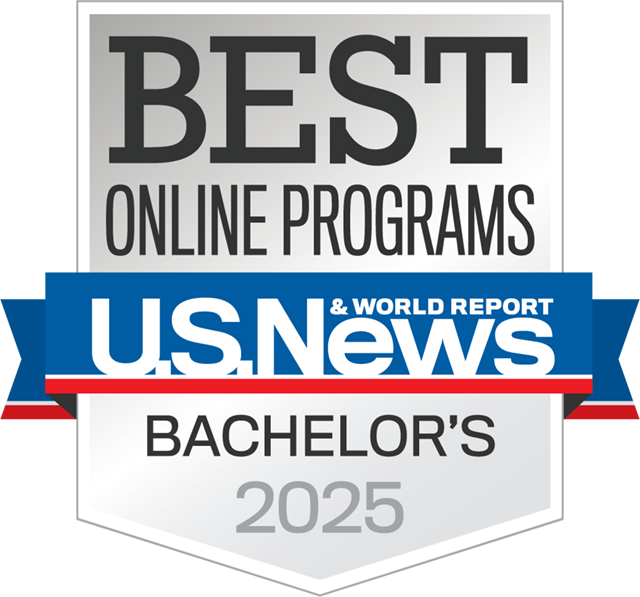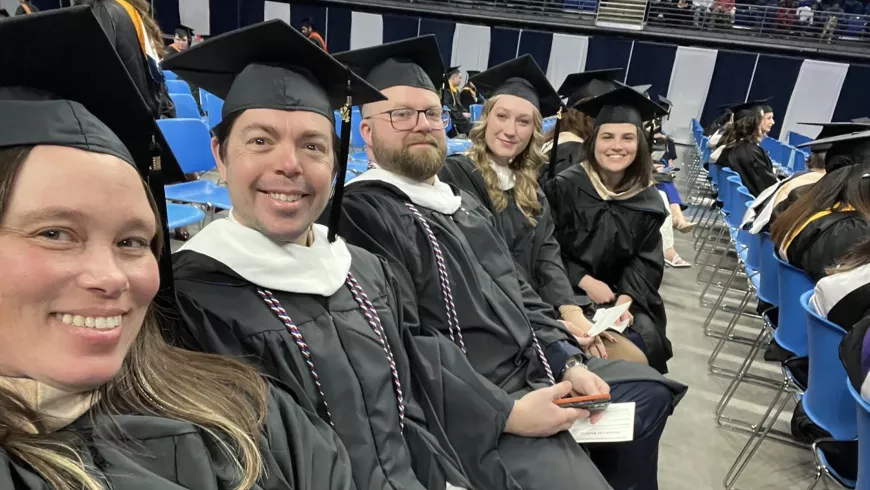100% Online
Complete your Penn State course work at your own pace and 100% online.
Application deadline
Credits and costs
Nationally Recognized

Gain Skills in Contemporary Labor Management and Supervisory Leadership
Explore a leader's role and function within contemporary organizations.
Study the supervisory and managerial behaviors of successful leaders.
Recognize how an organization's internal structure impacts employee performance.
Identify strategies for overcoming conflict and obstacles in the workplace.
Understand how leaders exercise influence in social groups and teams.
Online Courses in Organizational Leadership
Online Courses in Organizational Leadership
In addition to required courses in organizational leadership, you will also choose from courses in communication arts and sciences; crime, law, and justice; labor and employment relations; management; philosophy; political science; psychology; and sociology.
This program requires that you complete a minimum of 120 credits.
A student enrolled in this major must receive a grade of C or better in all courses required for the major.
Prescribed Courses (21 credits)
- 3credits
This course introduces key leadership concepts and practices based on current theory and research. It is designed to help students to discover the knowledge and skills that are characteristic of effective leaders.
- 3credits
Examines the nature of organizations along with its various interconnected functions such as leadership, financial, communications, technology, production, sales, etc.
- 3credits
Starts by examining different kinds of evidence and analyzing their quality and usefulness; students can then learn how to use that evidence to improve their leadership.
- 3credits
Theory- and research-based communication skills for leaders dealing with work-related problems in contemporary groups and organizations.
- or:3credits
Surveys the theory, research, and practice related to the communication processes by which individuals in groups and organizations exercise influence, whether or not they occupy positions of acknowledged leadership.
- 3credits
Application of theories of decision-making to work-related issues in groups and organizations requiring collective resolution and action.
- or:3credits
Application of theories of decision making to work-related issues in groups and organizations requiring collective resolution and action.
- 3credits
Introduction to general psychology; principles of human behavior and their applications.
- 3credits
Survey of theory and research with respect to attitudes, morale, and motivation of employees and management.
- Prerequisite
PSYCH 100; PSYCH 200 or STAT 200
Additional Courses (12 credits)
Select one course from each area.
Critical Thinking (select 3 credits)
- 3credits
The use, analysis, and design of information systems and technologies to organize, coordinate, and inform human enterprises.
- Note
The credits earned in this course may be applied toward the Social and Behavioral Sciences (GS) requirement.
- 3credits
Discussion of the validity, soundness, and fallacies of everyday language use and reasoning; informal logic; and manipulative arguments and propaganda.
- GH
The credits earned in this course may be applied toward the Humanities (GH) requirement.
Organizational Behavior (select 3 credits)
- 3credits
The course will be offered at an introductory level. It is designed to encourage students to explore individual and group behavior at work.
- 3credits
Personnel selection, training, accident prevention, morale, and organizational behavior.
- Prerequisite
PSYCH 100
Conflict Management (select 3 credits)
- 3credits
Theories and strategies important for conceptualizing, developing, and managing conflict negotiation, mediation, and third-party intervention.
- Prerequisite
3rd Semester Standing or 6 credits of CAS
- 3credits
The objective of this course is to enhance students' abilities to use a range of methodologies to evaluate and conduct research in the field of employment relations and human resource management.
- 3credits
This course examines dispute resolution procedures in unionized and nonunion workplaces.
- Prerequisite
LHR 100 or 3 other credits of LHR or 6th 5th Semester standing
- 3credits
Experiential-based course covering the four main social research methods: available data, survey research, experiments, and field research.
- Prerequisite
3 credits in Sociology
Ethics (select 3 credits)
- 3credits
Explores ethics from both a normative and behavioral perspective; four interrelated and mutually reinforcing subject areas will be explored in the course at the individual, organizational and transnational levels business ethics, ethics in unionized firms, corporate social responsibility, and sustainability.
- Prerequisite
LHR 100 or fifth-semester standing or 3 other credits of LHR
- 3credits
Leaders, in whatever context, make difficult decisions, distribute scarce resources, direct and influence the conduct of others, and represent the goals of the enterprise they lead. Thus they ought to exemplify prudence, fairness, integrity, honesty, trustworthiness, sincerity, and morally upright behavior. This course investigates these concepts and the moral dilemmas that arise in developing or applying them.
Supporting Courses and Related Areas (select 3–4 credits)
Select 3–4 credits at the 400-level from the following list of courses. Courses that are used in the Additional Courses category may not be double-counted to satisfy this requirement.
- 3credits
The course examines the continuing influence of social and environmental factors in shaping leadership and leadership development.
- 3credits
This course explores the science and practice of leadership around the globe through pertinent scholarly literature and related instructional resources.
- Prerequisite
OLEAD 100 and sixth-semester standing
- 3credits
Through the review of literature and research on leadership, problem-solving in leadership scenarios, and self-assessment, students will gain a working definition of leadership and identify and develop leadership traits/competencies to encourage more women to be successful future leaders.
- Prerequisite
OLEAD 100 and sixth-semester standing
- 1–12credits
Supervised practicum in organizational leadership.
- 1–18credits
Creative projects, including research and design, which are supervised on an individual basis and which fall outside the scope of formal courses.
- 3credits
The study of social influence, leadership and status, and social cohesion and commitment processes in small groups.
- 3credits
Work and occupational life in modern society; work in the past, present, and future.
- 3credits
The role of gender in shaping contemporary North American patterns of employment, occupational roles, and statuses.
Or any 400-level course from:
ACCTG, AFAM, AFR, AGBM, AMST, ANTH, ASIA, BA, BBH, BLAW, CAS, CEDEV, COMM, CRIM, CRIMJ, ECON, EDUC, ENTR, FIN, FR, GER, HIST, HDFS, HLS, HPA, IB, IST, IT, LA, LAS, LAWSC, LHR, MATH, MGMT, MIS, MKTG, OLEAD, PHIL, PLSC, PSYCH, PUBPL, RUS, SCM, SOC, SPAN, STAT, WMNST
Bachelor of Arts Degree Requirements
Some Bachelor of Arts requirements may be satisfied by courses required for the major, General Education courses, or electives. Students should work with an adviser to select courses.
- Foreign Language: 0–12 credits
Students must attain 12th credit level of proficiency in one foreign language. - B.A. Fields: 9 credits
Humanities, Social and Behavioral Sciences, Arts, Foreign Languages, Natural Sciences, Quantification (cannot be taken in the area of the student's primary major; foreign language credits in this category must be in a second foreign language or beyond the 12th credit level of proficiency in the first language) - Other Cultures: 0–3 credits
Select 3 credits from approved list. Students may count courses in this category in order to meet other major, minor, elective, or General Education requirements, except for the General Education US/IL requirement.
General Education Requirements
Some General Education requirements may be satisfied by courses required for the major. Students should work with an adviser to select courses.
- Foundations: 15 credits
All courses require a grade of C or better. Inter-Domain courses may not be used for foundations requirements.- Writing/Speaking: 9 credits
- Quantification: 6 credits
3-6 credits are selected from mathematics, applied mathematics, and statistics; 3 credits may be selected from computer science or symbolic logic.
- Knowledge Domains: 15 credits
Inter-Domain courses may not be used for knowledge domain requirements.- Health and Wellness (GHW): 3 credits
- Natural Sciences (GN): 3 credits
- Arts (GA): 3 credits
- Humanities (GH): 3 credits
- Social and Behavioral Sciences (GS): 3 credits
- Integrative Studies: 6 credits
- Inter-Domain course work: 6 credits
- Exploration: 9 credits
- Natural Sciences (GN) (may be Inter-Domain): 3 credits
- GA, GH, GN, GS, and Inter-Domain courses: 6 credits
May include 3 credits of World Language course work beyond the requirements of the student’s degree program or at the 12th credit level, whichever is higher.
These General Education Requirements are for students who started in summer 2023 or later. Students who started earlier can review the prior version of the general education requirements.
Elective Courses (select 18-24 credits)
Among the degree requirements, students should incorporate at least:
- 3 credits in U.S. cultures
- 3 credits in international (IL) cultures
- 3 credits in writing-across-the-curriculum courses
The course list includes only courses offered by World Campus. An official degree audit or the recommended academic plan for this program may include additional course options and detailed requirements. All students are expected to complete at least 36 Penn State credits to earn this degree. Please consult an academic adviser for details.
Course Availability
If you're ready to see when your courses will be offered, visit our public LionPATH course search (opens in new window) to start planning ahead.
Start or Advance Your Career

Start or Advance Your Career
You can use the knowledge gained from this program and the support of Penn State career resources to pursue careers in a variety of fields, depending on your goals.
Job Titles Related to This Degree
A rapidly growing global environment creates demand for professionals who are schooled in leadership. Employers look for individuals who exhibit strengths in problem-solving, teamwork, critical thinking, sound judgment and decision-making, listening, and conflict management.
The following roles are often held by people with this type of degree:
- Account Manager
- Business Manager
- Client Relationship Manager
- Development Director
- Regional Sales Manager
Employment Outlook for Occupational Fields Related to This Degree
Estimates of employment growth and total employment are provided by the U.S. Bureau of Labor Statistics and are subject to change. While these occupations are often pursued by graduates with this degree, individual outcomes may vary depending on a variety of factors. Penn State World Campus cannot guarantee employment in a given occupation.
General and Operations Managers
Sales Managers
Fundraising Managers
What Can You Do with a Leadership Degree?
A Bachelor of Arts in Organizational Leadership can prepare you to work in a range of relationship-focused careers in which your leadership skills can contribute positively to the overall business climate and interpersonal interactions, including:
- manufacturing
- service industries
- government
- communications
- charitable and nonprofit organizations
- multinational organizations
Career Services to Set You Up for Success

From the day you're accepted as a student, you can access resources and tools provided by Penn State World Campus Career Services to further your career. These resources are beneficial whether you're searching for a job or advancing in an established career.
- Opportunities to connect with employers
- Career counselor/coach support
- Occupation and salary information
- Internships
- Graduate school resources
Ready to Learn More?
Get the resources you need to make informed decisions about your education. Request information on this program and other programs of interest by completing this form.
Ready to take the next step toward your Penn State bachelor's degree?
Costs and Financial Aid
Costs and Financial Aid
Learn about this program's tuition, fees, scholarship opportunities, grants, payment options, and military benefits.
Costs and Financial Aid
Undergraduate Tuition
Undergraduate tuition is calculated based on the number of credits for which you register and the number of total credits you have accrued at or transferred to Penn State.
Tuition is due shortly after each semester begins, and rates are assessed every semester of enrollment.
2025–26 Academic Year Rates
| How many credits do you plan to take per semester? | If you have 59 or fewer credits | If you have 60 or more credits |
|---|---|---|
| 11 or fewer | $638 per credit | $685 per credit |
| 12–19 | $7,755 per semester | $8,371 per semester |
Undergraduate students taking more than 19 credits will be charged the flat tuition rate plus the regular per credit hour rate for each credit above 19.
2026–27 Academic Year Rates
| How many credits do you plan to take per semester? | If you have 59 or fewer credits | If you have 60 or more credits |
|---|---|---|
| 11 or fewer | $644 per credit | $692 per credit |
| 12–19 | $7,833 per semester | $8,455 per semester |
Undergraduate students taking more than 19 credits will be charged the flat tuition rate plus the regular per credit hour rate for each credit above 19.
Financial Aid and Military Benefits
Some students may qualify for financial aid. Take the time to research financial aid, scholarships, and payment options as you prepare to apply. Federal financial aid may only be used to pay for credits used to satisfy program requirements.
Military service members, veterans, and their spouses or dependents should explore these potential military education benefits and financial aid opportunities, as well.
Additional Cost of Attendance Details
To view the detailed list of cost of attendance elements:
- visit the Tuition Information site
- click the plus sign to expand the table
- select a semester from the World Campus row
Who Should Apply?
Who Should Apply?
This 100% online degree program is appealing to professionals and students with a variety of backgrounds, particularly if you:
- occupy a managerial/leadership position but must obtain a degree for further professional advancement
- have faced challenges starting or completing your college education due to life circumstances or geographical constraints
- are an active-duty soldier or veteran looking to advance in the military ranks or transition into civilian life
Understanding the Difference between a B.S. and a B.A.
The Bachelor of Science (B.S.) integrates more prescribed (core) courses, thus offering a solid foundation and more direction to students who are newer to leadership.
This Bachelor of Arts (B.A.) offers a high degree of customization and is an ideal choice if you already have significant leadership experience.
Set Your Own Pace

Set Your Own Pace
Whether you are looking to finish your program as quickly as possible or balance your studies with your busy life, Penn State World Campus can help you achieve your education goals. Many students take one or two courses per semester.
Our online courses typically follow a 12- to 15-week semester cycle, and there are three semesters per year (spring, summer, and fall). If you plan to take a heavy course load, you should expect your course work to be your primary focus and discuss your schedule with your academic adviser.
To Finish Your Degree in Two to Three Years
- Take 6 courses each semester
To Finish Your Degree in Three to Four Years
- Take 4–5 courses each semester
To Finish Your Degree in Five or More Years
- Take 2–3 courses each semester
Timelines may vary for students transferring credits from another school or based on course availability.
Convenient Online Format
This program's convenient online format gives you the flexibility you need to study around your busy schedule. You can skip the lengthy commute without sacrificing the quality of your education and prepare yourself for more rewarding career opportunities without leaving your home.
A Trusted Leader in Online Education

Penn State has a history of more than 100 years of distance education, and World Campus has been a leader in online learning for more than two decades. Our online learning environment offers the same quality education that our students experience on campus.
Information for Military and Veterans

Are you a member of the military, a veteran, or a military spouse? Please visit our military website for additional information regarding financial aid, transfer credits, and application instructions.
How to Apply to Penn State

How to Apply to Penn State
Apply by October 31 to start January 12
Application Instructions
Deadlines and Important Dates
Complete your application and submit all required materials by the appropriate deadline. Your deadline will depend on the semester you plan to start your courses.
Spring Deadline
Apply by October 31 to start January 12Summer Deadline
Apply by March 15 to start May 18Fall Deadline
Apply by June 30, 2026, to start August 24, 2026
New students are encouraged to complete the FAFSA by March 1. Please visit the Office of Student Aid website for more information about applying for financial aid and recommended deadlines.
Steps to Apply
To apply for this program, you must be a high school graduate, or have completed your GED.
You will need the following items to complete your application:
High school transcripts or GED transcript — First-year applicants are required to submit Self-Reported Academic Records (SRAR) when applying. Official high school transcripts for first-year applicants will only be required at the time a student accepts an offer of admission to Penn State.
Transfer international students will need to submit their high school transcript before their application can be reviewed.
Official college or university transcripts and/or official military transcripts (if applicable) — All college or university transcripts are required regardless of the length of time that has passed, the grades earned, or the accreditation of the institutions attended. Acceptance of transfer credit toward your degree is subject to final approval by the academic department. For detailed information, see the Transfer Students page.
Transcripts not in English must be accompanied by a certified translation.
English Proficiency — The language of instruction at Penn State is English. With some exceptions, international applicants must take and submit scores for the Test of English as a Foreign Language (TOEFL) or International English Language Testing System (IELTS). Minimum test scores and exceptions are found in the English Language Proficiency section on the Undergraduate Admissions International Requirements page. Visit the TOEFL website for testing information. Penn State's institutional code is 2660.
To begin the online application, you will need a Penn State account.
Create a New Penn State Account
If you have any problems during this process, contact an admissions counselor at [email protected].
Please note: Former Penn State students may not need to complete the admissions application or create a new Penn State account. Please visit our Returning Students page for instructions.
Accessing MyPennState
The MyPennState Portal provides access to our online admissions services. Before accessing MyPennState, you must have a Penn State account that will be used to access all Penn State systems. After creating an account, you will receive a unique Penn State User ID. You will need to enter your User ID followed by @psu.edu when signing in to MyPennState and other Penn State sites. For example, you should be entering something like '[email protected]' in the Sign In field.
The application consists of six sections:
- Application Setup
- Program of Study
- Citizenship and Residency
- Academics and Experience
- Miscellaneous
- Review and Submit
Application Setup
Be sure to select "Online" for the "How would you like to complete your degree" question if you plan to attend Penn State World Campus.
The rest of this section will ask some basic questions about your education experience and military affiliation.
Program of Study
You will choose the degree type and then the starting semester.
Your starting campus will be selected as Penn State World Campus by default as long as you picked "Online" in your Application Setup. Click Continue.
On the Choose a Program page, select your intended major from the list.
Review your selection on the summary screen and click Continue to move on to the Citizenship and Residency section.
Citizenship and Residency
Complete the series of questions about your citizenship status, demographic information, Pennsylvania residency status, and family history.
Academics and Experience
You will need to enter academic experience information about your high school and any attempted courses at a college or university after high school.
The Education Gap Statement offers a place to explain any time that has elapsed between your high school graduation and your anticipated enrollment at Penn State. Please provide a summary of why that gap occurred. Some examples that would explain a gap in your education include work, family, attending another college or university, etc.
Miscellaneous
In the Miscellaneous section, you will provide any program-specific requirements (e.g., a personal statement), information about activities, and financial aid information.
Review and Submit
Review your information, digitally sign your application, and provide payment for the application fee ($65 domestic or $75 international).
High School Transcripts and Academic Record
After your application is completed, you will also need to self-report your high school course work before the application deadline. You will be directed to fill out the Self-Reported Academic Record (SRAR). It is helpful to have a high school transcript available when completing this section. In the third section, you'll select your program of study and campus.
Official high school transcripts or GED transcript, along with records from high school, are required, regardless of the length of time that has passed.
Include any college/university transcripts (required), military transcripts, and Proof of English Language proficiency (if applicable). SAT/ACT scores are not required if you are identified as an adult learner or transfer student.
All official documents should be sent to:
Undergraduate Admissions Office
The Pennsylvania State University
201 Shields Building
University Park, PA 16802You can also have your transcripts sent electronically through Parchment, eScript-Safe, or the National Clearinghouse directly to Penn State from the college/university where course work was attempted.
Acceptance
After receiving your application, application fee, and all required materials, your application will be evaluated for admission. You can check your application status online. This will provide the most up‐to‐date information about the status of your application and is updated once daily, before 8:00 a.m. (ET). Once a decision has been made regarding your application, it will be available to you through the MyPennState portal.
For information on when you can expect an admissions decision, visit the Dates and Deadlines page of the Undergraduate Admissions website. Make sure you click the "+" sign to see these dates for World Campus Applicants (First-Year and Transfer).
5. Complete the application.
Admissions Help
If you have questions about the admissions process, contact an admissions counselor at [email protected].
Contact Us

Contact Us
Have questions or want more information? We're happy to talk.
To learn more about the Bachelor of Arts in Organizational Leadership, please contact:
World Campus Admissions Counselors
Phone: 814-863-5386
[email protected]
Learn from the Best
Learn from the Best
This program will give you the opportunity to study with highly regarded faculty from Penn State's College of the Liberal Arts, one of the premier liberal arts institutions in the world.
School Director
Elaine Farndale
Director, School of Labor and Employment Relations
- DegreePh.D., Cranfield University of Management, United Kingdom
- DegreeM.A., Personnel Management, Kingston University, United Kingdom
- DegreeB.A., French and Modern Dutch Studies, University of Hull, United Kingdom
Dr. Elaine Farndale is director of the School of Labor and Employment Relations and a professor of human resource management. Dr. Farndale's areas of specialization and research include international and comparative human resource management (HRM); the power, professionalism, and roles of the HR department; HRM and firm performance; change management and HRM; eHRM and new HR delivery mechanisms; and HRM and employee engagement. She has presented numerous papers at international conferences and has published articles and chapters in both the practitioner and academic press. Dr. Farndale has also worked as an HR specialist for several years.
Lead Faculty
Brian Redmond
- DegreePh.D., I/O Psychology, Graduate Center, City University of New York
- DegreeM.A., I/O Psychology, New York University
- DegreeB.A., Psychology, Castleton State University
Dr. Brian Redmond is a teaching professor and the lead faculty for labor and human resources and organizational leadership. He worked in several organizations (manufacturing, financial, education, management, and service) before deciding that education was his true calling. He still performs organizational consulting, specifically in the realms of leadership, organizational behavior, and online education. Dr. Redmond teaches and authors courses in leadership that span the undergraduate, graduate, and professional levels. He has been teaching online since 2004. He has published and presented research and applied solutions regarding online education since 2003.
Faculty
Carol Cameron
- DegreePh.D., Organization and Management, Capella University
- DegreeMBA, Organizational Behavior, Westminster College
Dr. Carol Cameron has been a corporate leadership and organization development consultant for more than 20 years, working with a range of organizations, from Fortune 500 companies to entrepreneurial start-ups in industries that include health care, financial services, high tech, and more. She transitioned to the academic arena in 2012, joining Harvard University as an internal consultant and executive coach to its deans and department administrators, and leading curriculum design and facilitation efforts for executive education in Harvard's Center for Workplace Development.
Donna J. Dennis
- DegreePh.D., Human Development, Fielding Graduate University
- DegreeM.S., Master of Education, University of Illinois
- DegreeB.S., Elementary Education, University of Illinois
Dr. Donna J. Dennis has worked as the vice president of company-wide talent management, designed leadership training, provided strategic planning and coaching programs, and provided executive development services, such as the facilitation of programs and identification of leadership and career development resources. Donna developed and facilitated the succession planning process for executive development at C.R. Bard, Inc. She also taught at the Wharton Business School and the University of Pennsylvania. Since launching Leadership Solutions Consulting, LLC, she has earned certification in executive coaching.
Michael Hamel
- DegreePh.D., Applied Psychology, Southern Illinois University-Carbondale
- DegreeM.S., Applied Psychology, Shippensburg University
- DegreeB.S., Biopsychology, Penn State
Dr. Michael Hamel has worked for more than a decade as an organizational consultant in both private and public industry, including the USAF, to evaluate and enhance their force-wide suicide prevention program. In his career, he has served as an instructor for research methods and statistics, organizational psychology, and I/O psychology. He serves as the evaluation director for Penn State Extension, leading a team of evaluation specialists in providing support for a multitude of educational programming initiatives.
Carmen Jones
- DegreePh.D., Organizational Leadership, Argosy University
- DegreeMBA, Point Park University
- DegreeM.S., Project Management, Keller Graduate School of Management
- DegreeB.S., Point Park University
Dr. Carmen Jones has held increasingly responsible positions with a major telecommunications company, providing business leadership in customer service, training and development, and upper management. She also uses her business expertise to work with a major health insurance company in its short-term disability division. Her research interests center on improving the understanding and performance of call center employees and their perceptions of motivation.
Douglas Lindsay
- DegreePh.D., Industrial/Organizational Psychology, Penn State
- DegreeM.S., Experimental Psychology, University of Texas at San Antonio
- DegreeB.S., Behavioral Sciences, United States Air Force Academy
Dr. Douglas Lindsay served for more than 22 years in the Air Force, where he held various roles such as scientist, professor, psychologist, and director. Since leaving the military, he has worked for several higher education institutions, businesses, and consulting organizations, developing leadership programs and educational courses focused on executive education and development. In addition to his consulting and coaching, he is the executive editor for the Center for Character and Leadership Development at the United States Air Force Academy.
Allison Maurer
- DegreePh.D., I/O Psychology, Saint Louis University
- DegreeM.S., I/O Psychology, Saint Louis University
- DegreeB.S., Business Administration, Fontbonne University
Dr. Allison Maurer has extensive experience in both the science and practice of management in the government (e.g., United States Secret Service and Department of Justice) and other business areas (e.g., Panera Bread, March of Dimes, and Badges for Vets). Her current research interests fall broadly into two categories: personnel selection and managerial decision-making. She has also taught a range of management courses at more than seven higher education institutions, including Penn State.
Kim Trahan
- DegreePh.D., Organizational Systems, Saybrook University
- DegreeM.S., Counseling and Human Development, University of Rochester
- DegreeB.A., Psychology/History, University of Rochester
Dr. Kim Trahan is an assistant teaching professor in organizational leadership. She has spent her career serving as an educator, administrator, career counselor, and consultant. Her work within universities has included teaching online undergraduate leadership courses and working as a career placement administrator, career programming administrator, and career counselor. Her human resources background includes serving as a training and development administrator. Dr. Trahan's interest is in emotional intelligence–based mindfulness approaches to help build leadership capacity.
News



